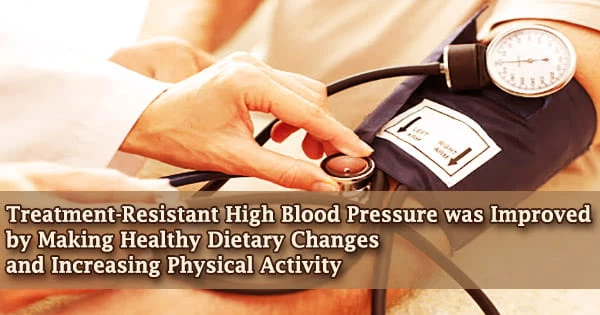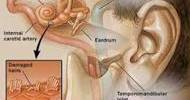According to new research published today in the American Heart Association’s flagship journal Circulation, people with treatment-resistant hypertension successfully reduced their blood pressure by adopting the Dietary Approaches to Stop Hypertension (DASH) eating plan, losing weight, and improving their aerobic fitness by participating in a structured diet and exercise program at a certified cardiac rehabilitation facility.
Resistant hypertension is defined as uncontrolled high blood pressure (130/80 mm Hg or greater) despite the administration of three or more drugs of various kinds, including a diuretic, to lower blood pressure. It affects roughly 5% of the worldwide population, and it may impact 20% to 30% of individuals with high blood pressure, according to various estimates. End-organ damage and a 50 percent increased risk of adverse cardiovascular events, such as stroke, heart attack, and death, are also linked to resistant hypertension.
High blood pressure is well-known to be treated with diet and exercise. Physical exercise is the best initial therapy option for persons with mild to moderately increased blood pressure and blood cholesterol who otherwise have a low risk of heart disease, according to the American Heart Association in June 2021.

TRIUMPH (Treating Resistant Hypertension Using Lifestyle Modification to Promote Health) is the first research to look at the effects of lifestyle changes in persons with resistant hypertension. Researchers discovered that behavioral adjustments such as frequent aerobic exercise, following the DASH diet, limiting salt consumption, and losing weight can considerably drop blood pressure and improve cardiovascular health in persons with resistant hypertension.
The DASH eating plan is high in fruits, vegetables, low-fat dairy products, and low salt, and it follows the nutrition guidelines of the American Heart Association. A total of 140 persons with resistant hypertension took part in the four-month clinical study (average age 63; 48 percent women; 59 percent Black adults; 31 percent with type 2 diabetes; and 21 percent with chronic kidney disease).
Participants were randomized into two groups at random. Three times a week, 90 patients got nutrition advice and exercise instruction in an intense, supervised cardiac rehabilitation environment. The remaining 50 people received a single instructional session from a health educator as well as written directions on how to exercise, lose weight, and eat healthy on their own.
The benefits of the lifestyle modifications may be reduced unless the healthy lifestyle habits can be maintained.
James A. Blumenthal
Researchers found:
- In the supervised program, participants’ systolic blood pressure dropped by roughly 12 points, compared to 7 points in the self-guided group. Systolic blood pressure (the first figure in a blood pressure reading) measures how much pressure blood exerts on artery walls when the heartbeats, and is a key risk factor for cardiovascular disease in individuals aged 50 and over.
- Blood pressure measurements taken over the course of a normal day found that the supervised lifestyle program group had a 7-point drop in systolic blood pressure, whereas the self-guided group had no change in blood pressure.
- Participants in the supervised program also improved in other crucial heart health markers, indicating that they were at a decreased risk of having a heart attack in the future.
“Our findings showed lifestyle modifications among people with resistant hypertension can help them successfully lose weight and increase their physical activity, and as a result, lower blood pressure and potentially reduce their risk of heart attack or stroke,” said James A. Blumenthal, Ph.D., first and senior author of the study, and J.P. Gibbons Professor of Psychiatry and Behavioral Sciences at Duke University School of Medicine in Durham, North Carolina.
“While some patients can make lifestyle changes on their own, a structured program of supervised exercise and nutrition adjustments in cardiac rehabilitation programs led by a multidisciplinary team of health care specialists is likely to be more beneficial.”
The success of the supervised program, according to Blumenthal, does not mean that people with resistant hypertension should stop taking their medications; rather, it suggests that they should speak with their doctors about possibly reducing dosages or changing medications based on their lower blood pressure values. Because the study was only done at Duke University School of Medicine, the results may not be applicable to larger groups of people.
The intense, organized, and supervised portion of the study, on the other hand, took place at a number of typical cardiac rehabilitation institutions in central North Carolina, with a wide range of educational and cultural backgrounds well represented. The method, according to the researchers, may be successfully adopted at comparable cardiac rehabilitation institutions across the county.
Furthermore, whether individuals who made major lifestyle changes would sustain them limits the study’s significance beyond the four months of monitoring. “The benefits of the lifestyle modifications may be reduced unless the healthy lifestyle habits can be maintained,” Blumenthal said.
“The most important point is that it is not too late to lower blood pressure by making healthy lifestyle choices,” he said. “Adopting a healthy lifestyle pays huge dividends, even for people whose blood pressure remains elevated despite being on three or more antihypertensive medications.”
This study, according to Bethany Barone Gibbs, Ph.D., FAHA, an American Heart Association volunteer expert, provides doctors with another evidence-based tool for assisting patients with resistant hypertension.
“Though we usually think about recommending lifestyle changes like losing weight and getting more physical activity before starting medications, this study provides important reinforcement that adding lifestyle changes in conjunction with medications and when medications alone are not doing the job is an effective strategy,” said Gibbs, an associate professor in the department of health and human development and clinical and translational sciences at the University of Pittsburgh. “Also exciting is that Blumenthal, et. al., used a cardiac rehab model, which can be duplicated in many settings.”
Gibbs, chair of the statement writing group for the American Heart Association’s June 2021 scientific statement on lifestyle treatment for hypertension, urged patients to make lifestyle changes such as losing 5 percent to 10% of their bodyweight, increasing DASH-style diet adherence, and increasing daily steps by at least 1,000.
















